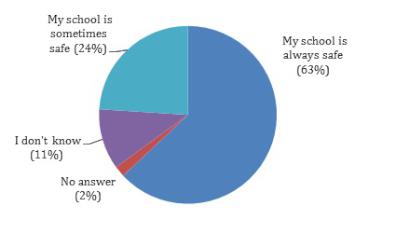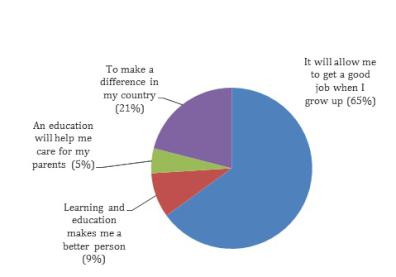24% of NZ children feel unsafe at school 21 Nov 2016
Related articles
Media release
21 November 2016
Keep us safe so we can learn
New Zealand children reveal their concerns about education and safety in global survey
“Being safe at school for me means a lot because if you don't feel safe then why should you go to school?” Amy, 11 years.
Children in New Zealand and around the world consider education a priority, despite concerns for their safety. Ninety-eight percent of kiwi kids think education is important, yet almost a quarter of our children feel safe at school only some of the time.
Between 2013 and 2016, 3,000 New Zealand children have voiced their opinions and concerns as part of the world’s largest poll of children’s opinions, ChildFund Global Alliance’s annual Small Voices, Big Dreams survey of children aged 10 to 12 years. The four surveys have asked children in more than 40 countries for their views on issues important to them including child rights.
In the just released 2016 ChildFund Small Voices, Big Dreams survey, children’s views on education were further explored. Eight hundred and four children from schools* up and down New Zealand were among the 6,226 children from 41 countries who participated globally.
Childlike optimism; grown-up concerns
The good news is that children love to learn and being with their friends at school. However, we should be concerned that our children don’t always feel safe at school.
Twenty-four percent of New Zealand children said their school was only sometimes safe. While 63 percent said their school was always safe, this leaves one in three children feeling scared or unsure about their safety.
ChildFund New Zealand Chief Executive Paul Brown comments on the results.
“Too many children are worried about being physically hurt and bullying in schools. To our kids, being safe at school means feeling protected and encouraged – many think of it as a second home.”
When asked “what do you love most about school”, 44 percent of Kiwi children chose ‘being with friends’ and 36 percent chose ‘learning new things’. These results reflect inverse priorities of children in developing countries where, 51 percent of children chose learning new things and 19 percent chose being with friends.
There is growing evidence that shows an association between positive perceptions of school climate, which encompasses safety and relationships, and improved outcomes for students and teachers.
“Research shows that how students feel at school impacts on both academic success and their wellbeing. It’s encouraging that our kids value their friendships so highly, and that the majority feel safe. Our kids want school to be a place they can enjoy spending their time and learn without fear. For around one in three, however, their feelings of being unsafe are concerning,” continues Mr Brown.
Even before entering secondary school, children value education as the key to their future. Almost two-thirds of New Zealand respondents (65 percent) said education would help them get a better job, while 21 percent believed it would help them make a difference in New Zealand. A combined 14 percent believed school would prepare them to care for their parents or be a better person.
In the 2013 survey, New Zealand children identified education and safety as their top priorities with 65 percent of New Zealand children agreeing with the statement “everyone should have a good education” and 62 percent with “everyone should be safe from crimes and also violence”; the latter result was significantly higher than the global average.
Children were free to choose these priorities from issues that included everything from transportation to the environment.
How do we fare globally?
Globally, 34 percent of children feel safe only sometimes or never when at school. There was no significant difference between developed and developing nations. Children’s perceptions of safety were also aligned.
Predominant views of what being safe included “not being at risk of physical or emotional abuse or violence” (28% all; 40% NZ), “security measures are in place to protect students and they feel safe” (43% all; 48% NZ), and “schools feel like a second home where children are welcomed” (21% all; 28% NZ).
Meg Gardinier, Secretary General of ChildFund Alliance says, “Children around the world are worried about some very grown-up issues. The world’s leaders recognised the importance of safe, meaningful education when they adopted the United Nations’ Sustainable Development Goal 4 in September 2015: ‘Ensure inclusive and equitable quality education and promote lifelong learning opportunities for all.’
“ChildFund Alliance is committed to doing all it can to provide children around the world with a safe, quality education. We recognise this is ambitious, but there has been much progress. The number of children and young people not attending school has almost halved since the turn of the century and in most countries there are now as many girls as boys in primary school.”
Let’s listen to our children
Last year, when asked what the adults in their life could do to protect children from harm: the majority of children said it was as simple as listening to what children have to say.
ChildFund has listened and taken children’s views to the highest levels of the United Nations and world governments. This has resulted in violence-specific goals and targets being added to the new Global Goals for Sustainable Development, a global agenda for the next 15 years.
Children’s voices for change have also been reinforced by a ChildFund Alliance-commissioned report by the Overseas Development Institute (ODI) analysing research from around the world, including New Zealand. The ODI report estimated that the total economic costs of physical, psychological and sexual violence against children were up to 8 per cent of global Gross Domestic Product, close to US$7 trillion a year.
No country is immune to these problems, and New Zealand is no exception.
Mr Brown concludes, “From both global and national perspectives, children’s safety is important for the economic health, sustainability and security of New Zealand and the world.
“Supporting the new Global Goals and efforts to eliminate all forms of violence against, and exploitation of, children would benefit all New Zealanders including our future leaders.
“New Zealand children would concur with these conclusions. Moreover, they are happy to provide solutions, if only we would listen.”
KEY NZ FINDINGS
Q. What does it mean to be safe at school? (a sample of views)
“A lot because if our life's just starting out it would be a shame if something would happen,” Emma, 11 years
“Being in a safe environment where everyone is a friend,” Kate, 11 years
“Being safe at school of me means a lot because if you don't feel safe then why should you go to school?” Amy, 11 years
“Having good friends at school,” Mercedes, 12 years
“Teachers that care. Students look after each other,” Hori, 12 years
“To be able to feel as safe as at home,” Timothy, 11 years
“It means that you feel like it could be your home,” Nathan, 12 years
“To be reassured that today will be a normal day,” Ryan, 12 years
Q. How safe do you feel at school?

Q. Why is school and education
important to you?
--- Ends ---
About ChildFund New Zealand
ChildFund New Zealand is a member of the ChildFund Alliance, an international child development organisation with more than 70 years of experience helping the world's neediest children. ChildFund New Zealand works for the well-being of children by supporting locally led initiatives that strengthen families and communities, helping them overcome poverty and protect the rights of their children. ChildFund's comprehensive programmes incorporate health, education, nutrition and livelihood interventions that sustainably protect, nurture and develop children. ChildFund works in any environment where poverty, conflict and disaster threaten the well-being of children.
| PARTICIPATING COUNTRIES | |||
| AFRICA | AMERICAS | ASIA | DEVELOPED |
| Benin | Bolivia | Afghanistan | Australia |
| Burkina Faso | Brazil | Bangladesh | Canada |
| Ethiopia | Ecuador | Cambodia | France |
| Ghana | El Salvador | India | Ireland |
| Guinea | Honduras | Indonesia | Japan |
| Kenya | Mexico | Laos | New Zealand |
| Liberia | Paraguay | Myanmar | South Korea |
| Mali | Nepal | Spain | |
| Senegal | Philippines | Sweden | |
| Sierra Leone | Sri Lanka | USA | |
| The Gambia | Timor-Leste | ||
| Uganda | Vietnam | ||
| Zambia | |||
About the Small Voices, Big Dreams Survey
The Small Voices, Big Dreams survey was conducted by ChildFund Alliance member organisations in May 2016. The survey was conducted in 41 countries with children aged 10 to 12. This included 31 developing nations in Africa, Asia and the Americas as well as 10 developed countries. A total of 6,226 children were surveyed—3,658 children in developing countries and 2,568 children in developed nations.
Two of the five questions were open-ended, meaning the children were not given a list of answers to choose from. The remaining questions were multiple choice. All translated responses were provided to global research company GfK for analysis. Code frames were developed by GfK Roper’s global research team and approved by ChildFund. The data was then compiled, coded and tabulated by GfK Roper.
Since 2010, the Small Voices, Big Dreams annual survey has been the world’s largest poll of children’s opinions. Each year thousands of children aged 11 to 12 years from Afghanistan to Zambia have shared their views on a range of important issues.
About ChildFund Alliance
ChildFund Alliance is a network of 11 child-focused development organisations working in 63 countries around the world. With an annual turnover of more than $500 million, ChildFund Alliance helps an estimated 15 million children and their families to overcome poverty.
Founded 75 years ago, our members are not-for-profit organisations which work directly with children, families and their communities. The Alliance seeks to speak with one global voice for, with and on behalf of children.
Our vision is a world in which children realise their rights and achieve their potential.
About GfK Roper
GfK is one
of the world’s largest research companies, with more than
11,000 experts working to discover new insights about the
way people live, think and shop, in more than 100 markets,
every day.
GfK Roper Public Affairs & Corporate Communications is a division of GfK. The group specialises in customised public affairs and public opinion polling, media and corporate communications research, and reputation measurement in the U.S. and globally. The division also serves as the official polling partner of the Associated Press conducting the AP-GfK Poll (ap-gfkpoll.com).
Participating Schools included
Aidanfield Christian School, Christchurch
Albany Junior High School, Auckland
Bruce McLaren Intermediate, Auckland
Churchill Park School, Auckland
Dannevirke South School, Dannevirke
Edendale Primary, Auckland
Favona School, Auckland
Gordonton School, Hamilton
Horsham Downs School, Horsham Downs
James Cook School, Manukau
James Hargest College, Invercargill
Kauri Park School, Auckland
Mayfield School, Mayfield
Ohoka School, Kaiapoi
Otumoetai Intermediate School, Tauranga
Ramarama School, Drury
Sacred Heart Primary, Timaru
St Hilda's School Collegiate, Dunedin
Te Atatu Intermediate, Auckland
Tikipunga High School, Whangarei
Te Kura o Takaro School, Palmerston North
Waimataitai School, Timaru
Whakatane Seventh-day Adventist School, Whakatane
News
Hilary Timmins' Award-Winning UK Documentary Series To Inspire NZ Students
29 Jun 2020 Education
Dream Catchers, produced and directed by Hilary Timmins, celebrates the success stories of more than thirty inspirational New... more
New Zealand reaffirms support for Flight MH17 judicial process
7 Mar 2020 News
Ahead of the start of the criminal trial in the Netherlands on 9 March, Foreign Minister Winston Peters has reaffirmed the need to... more
Business
NZ Government's Economic package to fight COVID-19
17 Mar 2020 Business News
The Coalition Government has launched the most significant peace-time economic plan in modern New Zealand history to cushion the... more
NZ Government announces aviation relief package
19 Mar 2020 Business News
Transport Minister Phil Twyford today outlined the first tranche of the $600 million aviation sector relief package announced earlier... more
Living
Diversity was Key at New Zealand Trade Tasting in London
6 Jun 2022 Food & Wine
New Zealand Winegrowers Annual Trade Tasting was recently held in London, on Wednesday 4 May, in Lindley Hall.
It was the first... more
Kiwi author stuns Behind the Butterfly Gate
12 Jan 2022 Arts
Hidden behind the Butterfly Gate is where the secret has been kept for 76 years...
New Zealand writer Merryn Corcoran’s... more
Property
Fairer rules for tenants and landlords
17 Nov 2019 Property
17 NOVEMBER 2019
The Government has delivered on its promise to the over one million New Zealanders who now rent to make it fairer... more
New Zealand Government will not implement a Capital Gains Tax
17 Apr 2019 Property
The Coalition Government will not proceed with the Tax Working Group’s recommendation for a capital gains tax, Jacinda Ardern... more
Migration
Boosting border security with electronic travel authority – now over 500,000 issued
19 Nov 2019 Migration
19 NOVEMBER 2019
We’ve improved border security with the NZeTA, New Zealand Electronic Travel Authority, which helps us to... more
Christchurch reinstated as refugee settlement location
18 Aug 2018 Migration
18 AUGUST 2018
HON IAIN LEES-GALLOWAY
The announcement that Christchurch can once again be a settlement location for refugees... more
Travel
Gallipoli Anzac Day services cancelled
19 Mar 2020 Travel & Tourism
The New Zealand and Australian Governments have announced this year’s joint Anzac Day services at Gallipoli will be cancelled... more
New Zealanders advised not to travel overseas
19 Mar 2020 Travel & Tourism
New Zealanders advised not to travel overseas
more
Sport
The Skipper's Diary: Sir Richard Hadlee honouring his father and NZ's Forty-Niners
27 Oct 2019 Cricket
NZNewsUK London Editor Charlotte Everett spoke to Sir Richard Hadlee about why he’s chosen to publish his father’s... more
PREVIEW: All Blacks v England semi-final
26 Oct 2019 Rugby
The two most convincing quarterfinals winners are set to square off in a semifinal showdown for the ages when the All Blacks meet old... more
Columns
Gordon Campbell on the Gareth Morgan crusade
11 Nov 2016 Opinion
Gordon Campbell on the Gareth Morgan crusade
First published on Werewolf
The ghastly likes of Marine Le Pen in France and Geert ... more
Gordon Campbell on the US election outcome
10 Nov 2016 Opinion
Column - Gordon Campbell
Gordon Campbell on the US election outcome
Well um.. on the bright side, there (probably)... more
Kiwi Success
Congratulations to Loder Cup winner
26 Sep 2018 People
25 SEPTEMBER 2018
The Loder Cup, one of New Zealand’s oldest conservation awards, has been awarded to Robert McGowan for 2018... more
Appointments to New Zealand National Commission for UNESCO
16 Aug 2018 Appointments
16 AUGUST 2018Appointments to New Zealand National Commission for UNESCO
HON JENNY SALESA
Associate Education Minister Jenny Salesa is... more
Recruitment
Historic pay equity settlement for education support workers
14 Aug 2018 Recruitment
14 AUGUST 2018Historic pay equity settlement for education support workers
RT HON JACINDA ARDERN
HON CHRIS HIPKINS
Prime Minister
The... more
Historic pay equity settlement for education support workers
22 Aug 2018 Recruitment
14 AUGUST 2018Historic pay equity settlement for education support workers
RT HON JACINDA ARDERN
HON CHRIS HIPKINS
Prime Minister
The... more
